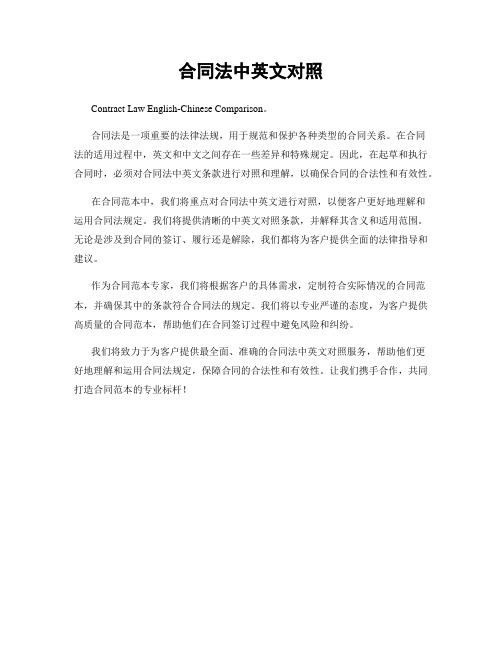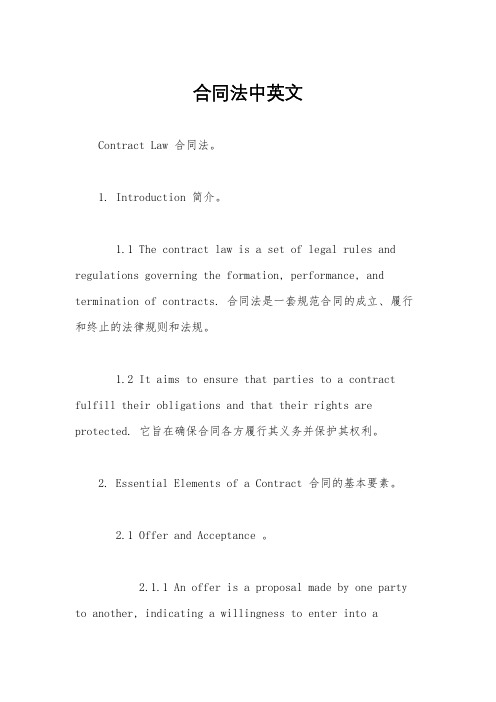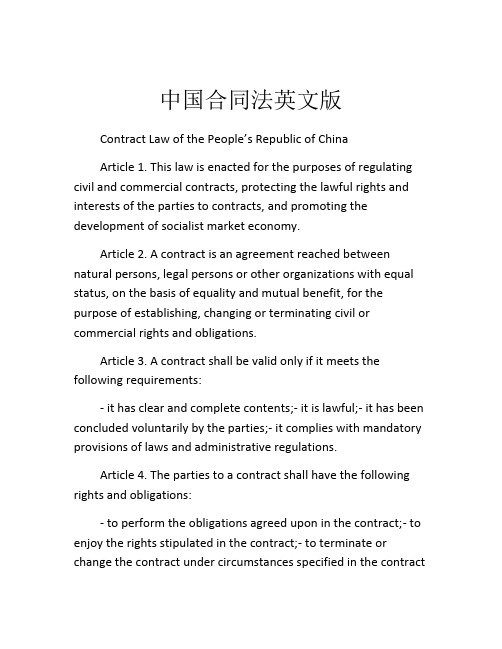中国合同法中英文对照
合同法中英文对照

Rights and Obligations:
1. Party A's Rights and Obligations:
- Delivery of the Subject Matter: Party A shall deliver the subject matter in accordance with the terms specified herein.
1. Breach and Penalty: In the event of a breach by either Party of any provision of this Agreement, the breaching Party shall pay to the non-breaching Party a penalty of [Specify the amount or percentage of the penalty] as compensation for the breach.
3. Exemptions: The Parties shall not be liable for any breach that is caused by force majeure or any other circumstances beyond their reasonable control.
七、合同或协议生效、变更与解除条款
Effective, Amendment, and Termination Terms:
1. Effective Date: This Agreement shall become effective upon [Specify the date, event, or condition upon which the Agreement becomes effective].
合同法中英文对照

合同法中英文对照
Contract Law English-Chinese Comparison。
合同法是一项重要的法律法规,用于规范和保护各种类型的合同关系。
在合同
法的适用过程中,英文和中文之间存在一些差异和特殊规定。
因此,在起草和执行合同时,必须对合同法中英文条款进行对照和理解,以确保合同的合法性和有效性。
在合同范本中,我们将重点对合同法中英文进行对照,以便客户更好地理解和
运用合同法规定。
我们将提供清晰的中英文对照条款,并解释其含义和适用范围。
无论是涉及到合同的签订、履行还是解除,我们都将为客户提供全面的法律指导和建议。
作为合同范本专家,我们将根据客户的具体需求,定制符合实际情况的合同范本,并确保其中的条款符合合同法的规定。
我们将以专业严谨的态度,为客户提供高质量的合同范本,帮助他们在合同签订过程中避免风险和纠纷。
我们将致力于为客户提供最全面、准确的合同法中英文对照服务,帮助他们更
好地理解和运用合同法规定,保障合同的合法性和有效性。
让我们携手合作,共同打造合同范本的专业标杆!。
合同法(分则)(第二部分)中英文

第十七章运输合同Chapter Seventeen: Carriage Contracts第一节一般规定Section One General Provisions第二百八十八条运输合同是承运人将旅客或者货物从起运地点运输到约定地点,旅客、托运人或者收货人支付票款或者运输费用的合同。
Article 288 Definition of Carriage Contract A carriage contract is a contract whereby the carrier carries the passenger or cargo from the place of departure to the prescribed destination, and the passenger, consignor or consignee pays the fare or freightage.第二百八十九条从事公共运输的承运人不得拒绝旅客、托运人通常、合理的运输要求。
Article 289 Common Carrier May Not Deny Reasonable Carriage Requirement A common carrier may not deny any normal and reasonable carriage requirement by a passenger or consignor.第二百九十条承运人应当在约定期间或者合理期间内将旅客、货物安全运输到约定地点。
Article 290 Obligation of Carrier to Carry in Safe and Timely Manner The carrier shall safely carry the passenger or cargo to the prescribed destination within the prescribed time or within a reasonable time.第二百九十一条承运人应当按照约定的或者通常的运输路线将旅客、货物运输到约定地点。
中国合同法(中英对照)

Chapter 6 Termination of Contractual Rights and Obligations第六章合同的权利义务终止Article 91 The rights and obligations under a contract shall be terminated under any of the following circumstances:(1) the obligations have been performed as agreed upon;(2) the contract has been rescinded;(3) the obligations have been offset against each other;(4) the obligor has escrowed the subject matter accordance with the law;(5) the obligee has released the obligor of its obligation;(6) the rights and obligations have vested in one party;(7) any other circumstances for termination as stipulated by the laws or agreed upon by the parties.第九十一条【合同消灭的原因】有下列情形之一的,合同的权利义务终止:(一)债务已经按照约定履行;(二)合同解除;(三)债务相互抵销;(四)债务人依法将标的物提存;(五)债权人免除债务;(六)债权债务同归于一人;(七)法律规定或者当事人约定终止的其他情形。
Article 92 After the termination of the rights and obligations under the contract, the parties shall observe the principal of honesty and good faith and perform the obligations of notification,assistance and confidentiality, etc. in accordance with relevant transaction practices.第九十二条【合同终止后的义务】合同的权利义务终止后,当事人应当遵循诚实信用原则,根据交易习惯履行通知、协助、保密等义务。
合同法中英文

合同法中英文Contract Law 合同法。
1. Introduction 简介。
1.1 The contract law is a set of legal rules and regulations governing the formation, performance, and termination of contracts. 合同法是一套规范合同的成立、履行和终止的法律规则和法规。
1.2 It aims to ensure that parties to a contract fulfill their obligations and that their rights are protected. 它旨在确保合同各方履行其义务并保护其权利。
2. Essential Elements of a Contract 合同的基本要素。
2.1 Offer and Acceptance 。
2.1.1 An offer is a proposal made by one party to another, indicating a willingness to enter into acontract. 。
2.1.2 Acceptance is the agreement to the terms of the offer. 。
2.1.3 Both offer and acceptance must be clear and definite. 。
2.2 Consideration 。
2.2.1 Consideration refers to something of value exchanged between the parties, such as money, goods, or services. 。
2.2.2 It is a crucial element to validate the contract. 。
中国合同法英文版

中国合同法英文版Contract Law of the People’s Republic of ChinaArticle 1. This law is enacted for the purposes of regulating civil and commercial contracts, protecting the lawful rights and interests of the parties to contracts, and promoting the development of socialist market economy.Article 2. A contract is an agreement reached between natural persons, legal persons or other organizations with equal status, on the basis of equality and mutual benefit, for the purpose of establishing, changing or terminating civil or commercial rights and obligations.Article 3. A contract shall be valid only if it meets the following requirements:- it has clear and complete contents;- it is lawful;- it has been concluded voluntarily by the parties;- it complies with mandatory provisions of laws and administrative regulations.Article 4. The parties to a contract shall have the following rights and obligations:- to perform the obligations agreed upon in the contract;- to enjoy the rights stipulated in the contract;- to terminate or change the contract under circumstances specified in the contractor as provided by law;- to claim damages in accordance with the law if the other party breaches the contract;- to take other measures provided by law to protect their lawful rights and interests.Article 5. A contract shall be legally binding and have compulsory force for the parties.Article 6. The interpretation of a contract shall be based on the intention of the parties as expressed in the contract.Article 7. When the parties fail to agree on certain matters or the agreement is unclear on certain matters, the provisions of the law and administrative regulations shall apply.Article 8. The formation, performance, termination and invalidity of contracts shall be governed by the law o f the People’s Republic of China.Article 9. The parties to a contract shall bear civil liability according to law for failure to perform contractual obligations or for breach of the contract.Article 10. If the parties agree to refer a dispute arising from the contract to arbitration, the arbitration clause shall be valid. If the parties fail to agree on the arbitration, the people’s court shall have jurisdiction.Article 11. Where there are no provisions in this law, other relevant laws and administrative regulations shall apply.。
第二章 合同法(中英文)

3、要约的法律效力 (1)要约的生效:合同法第十六条“要约到达 受要约人时生效”。An offer becomes effective when it reaches the offeree . (2)要约的撤回:合同法第十七条“要约可以 撤回。撤回要约的通知应当在要约到达受要约人 之前或者与要约同时到达受要约人。” An offer may be withdrawn, if the withdrawal notice reaches the offeree before or at the same time when the offer arrives. (3)要约的撤销:合同法第十八条“要约可以 撤销。撤销要约的通知应当在受要约人发出承诺 通知之前到达受要约人。” An offer may be revoked, if the revocation reaches the offeree before it has dispatched an acceptance.
第一节、合同法概述 一、合同与合同法的概念 (一)合同的概念 我国现行《合同法》第二条规定,合同是平等主 体的自然人、法人、其他组织之间设立、变更、 终止民事权利义务关系的协议。 A contract means an agreement on the establishment, alteration or termination of a civil right-obligation relationship between natural persons, legal person or other organization as subjects with equal status. 合同法简言之,就是规范合同的法律。合同法是 调整平等主体之间合同关系的法律规范的总和。 Contract Laws are the legal norms of adjusting contractual relationship between equal parties.
2020年合同法中英对照参照模板

Contract Law of the People's Republic of China中华人民共和国合同法(Adopted at the Second Session of the Ninth National People's Congress on March 15, 1999 and promulgated by Order No. 15 of the President of the People’s Republic of China on March 15, 1999)《中华人民共和国合同法》已由中华人民共和国第九届全国人民代表大会第二次会议于1999年3月15日通过,现予公布,自1999年10月1日起施行。
ContentsGeneral Provisions总则Chapter I Common Provisions第一章一般规定Chapter II Making of the Contract第二章合同的订立Chapter III Validity of the Contract第三章合同的效力Chapter IV Fulfillment of the Contract第四章合同的履行Chapter V Modification and Transfer of the Contract第五章合同的变更和转让Chapter VI Termination of Rights and Obligations under the Contract第六章合同的权利义务终止Chapter VII Liability for Breach of Contract第七章违约责任Chapter VIII Miscellaneous Provisions Specific Provisions第八章其他规定Chapter IX Purchase and Sale Contracts第九章买卖合同Chapter X Contracts for the Supply and Consumption of Electricity, Water, Gas or Heat第十章供用电、水、气、热力合同Chapter XI Donation Contracts第十一章赠与合同Chapter XII Loan Contracts第十二章借款合同Chapter XIII Lease Contracts第十三章租赁合同Chapter XIV Contracts for Financial Lease第十四章融资租赁合同Chapter XV Work Contracts第十五章承揽合同Chapter XVI Construction Project Contracts第十六章建设工程合同Chapter XVII Carriage Contracts第十七章运输合同Chapter XVIII Technology Contracts第十八章技术合同Chapter XIX Contracts of Deposit第十九章保管合同Chapter XX Warehousing Contracts第二十章仓储合同Chapter XXI Entrustment Contracts第二十一章委托合同Chapter XXII Brokerage Contracts第二十二章行纪合同Chapter XXIII Intermediation Contracts第二十三章居间合同Supplementary Provisions附则General Provisions总则Chapter I Common Provisions第一章一般规定Article 1 This Law is enacted for the purpose of protecting the legitimate rights and interests of the parties to contracts, maintaining the socio-economic order and promoting the socialist modernization.第一条为了保护合同当事人的合法权益,维护社会经济秩序,促进社会主义现代化建设,制定本法。
- 1、下载文档前请自行甄别文档内容的完整性,平台不提供额外的编辑、内容补充、找答案等附加服务。
- 2、"仅部分预览"的文档,不可在线预览部分如存在完整性等问题,可反馈申请退款(可完整预览的文档不适用该条件!)。
- 3、如文档侵犯您的权益,请联系客服反馈,我们会尽快为您处理(人工客服工作时间:9:00-18:30)。
(1999年3月15日第九届全国人民代表大会第二次会议通过)总则第一章一般规定第二章合同的订立第三章合同的效力第四章合同的履行第五章合同的变更和转让第六章合同的权利义务终止第七章违约责任第八章其他规定分则第九章买卖合同第十章供用电、水、气、热力合同第十一章赠与合同第十二章借款合同第十三章租赁合同第十四章融资租赁合同第十五章承揽合同第十六章建设工程合同第十七章运输合同第十八章技术合同第十九章保管合同第二十章仓储合同第二十一章委托合同第二十二章行纪合同第二十三章居间合同附则General Provisions 总则Chapter 1 General Provisions 第一章一般规定Article 1 This Law is enacted in order to protect the lawful rights and interests of the contracting parties, to maintain social and economic order, and to promote the process of socialist modernization.第一条【立法目的】为了保护合同当事人的合法权益,维护社会经济秩序,促进社会主义现代化建设,制定本法。
Article 2 A contract in this Law refers to an agreement amongnatural persons, legal persons or other organizations as equalparties for the establishment, modification of a relationshipinvolving the civil rights and obligations of such第二条entities.Agreements concerning personal relationships such as marriage,adoption, guardianship, etc.shall be governed by the provisions in other laws.【合同定义】本法所称合同是平等主体的自然人、法人、其他组织之间设立、变更、终止民事权利义务关系的协议。
婚姻、收养、监护等有关身份关系的协议,适用其他法律的规定。
Article 3 Contracting parties shall have equal legal status, and no party may impose its will on the other party.第三条【平等原则】合同当事人的法律地位平等,一方不得将自己的意志强加给另一方。
Article 4 The parties have the right to lawfully enter into a contract of their own free will in accordance with the law, and no unit or individual may illegally interfere therewith.第四条【合同自由原则】当事人依法享有自愿订立合同的权利,任何单位和个人不得非法干预。
Article 5 The parties shall adhere to the principle of fairness in deciding their respective rights and obligations.第五条【公平原则】当事人应当遵循公平原则确定各方的权利和义务。
Article 6 The parties shall observe the principle of honesty and good faith in exercising their rights and performing their obligations.第六条【诚实信用原则】当事人行使权利、履行义务应当遵循诚实信用原则。
Article 7 In concluding and performing a contract, the parties shall comply with the laws and administrative regulations, respect social ethics, and shall not disrupt the social and economic order or impair the public interests.第七条【遵纪守法原则】当事人订立、履行合同,应当遵守法律、行政法规,尊重社会公德,不得扰乱社会经济秩序,损害社会公共利益。
Article 8 A lawfully established contract shall be legally binding on the parties thereto, each of whom shall perform its own obligations in accordance with the terms of the contract, and no party shall unilaterally modify or terminate the contract.The contract established according to law is protected by law.第八条【依合同履行义务原则】依法成立的合同,对当事人具有法律约束力。
当事人应当按照约定履行自己的义务,不得擅自变更或者解除合同。
依法成立的合同,受法律保护。
Chapter 2 Conclusion of Contracts 第二章合同的订立Article 9 In entering into a contract, the parties shall have appropriate capacities for civil rights and civil acts.A party may appoint an agent to enter into a contract on its behalf in accordance with the law.第九条【订立合同的能力】当事人订立合同,应当具有相应的民事权利能力和民事行为能力。
当事人依法可以委托代理人订立合同。
Article 10 The parties may use written, oral or other forms in entering into a contract.A contract shall be in written form if the laws or administrative regulations so provide. A contract shall be concluded in written form if the parties so agree.第十条【合同的形式】当事人订立合同,有书面形式、口头形式和其他形式。
法律、行政法规规定采用书面形式的,应当采用书面形式。
当事人约定采用书面形式的,应当采用书面形式。
Article 11 "Written form" refers to a form such as a written contractual agreement, letter, electronic data text(including a telegram, telex, fax, electronic data exchange and e-mail)that can tangibly express the contents contained therein.第十一条【书面形式】书面形式是指合同书、信件和数据电文(包括电报、电传、传真、电子数据交换和电子邮件)等可以有形地表现所载内容的形式。
Article 12 The contents of a contract shall be agreed upon by theparties, and shall generally contain the following clauses:(1) titles or names and domiciles of the parties;(2) subject matter;(3)第十二条quantity;(4) quality;(5) price orremuneration;(6) time limit, place and method of performance;(7) liability for breach of contract; and(8) method to settle disputes.The parties may conclude a contract by reference to a model text of each kind of contract.【合同内容】合同的内容由当事人约定,一般包括以下条款:(一)当事人的名称或者姓名和住所;(二)标的;(三)数量;(四)质量;(五)价款或者报酬;(六)履行期限、地点和方式;(七)违约责任;(八)解决争议的方法。
当事人可以参照各类合同的示范文本订立合同。
Article 13 The parties shall conclude a contract in the form of an offer and an acceptance.第十三条【订立合同方式】当事人订立合同,采取要约、承诺方式。
Article 14 An offer is an expression of an intent to enter into a contract with another person. Such expression of intent shall comply with the following:(1) its contents shall be specific and definite;(2) it indicates that the offeror will be bound by the expression of intent in case of acceptance by the offeree.第十四条【要约】要约是希望和他人订立合同的意思表示,该意思表示应当符合下列规定:(一)内容具体确定;(二)表明经受要约人承诺,要约人即受该意思表示约束。
